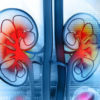Urinary Tract Infection (UTI) Treatment in Northern New Jersey
 Urinary tract infections (UTIs) are common in both men and women and always require prompt treatment. Bergen Medical Associates has numerous locations across northern New Jersey. The medical team is highly trained in various specialties, including gynecology and urology. Learn more about the condition and UTI treatments available at Bergen Medical Associates.
Urinary tract infections (UTIs) are common in both men and women and always require prompt treatment. Bergen Medical Associates has numerous locations across northern New Jersey. The medical team is highly trained in various specialties, including gynecology and urology. Learn more about the condition and UTI treatments available at Bergen Medical Associates.
What Is a Urinary Tract Infection?
A urinary tract infection is an infection in any part of a person’s urinary system. This includes:
- Kidneys
- Bladder
- Ureters
- Urethra
Types of UTIs
The most common types of UTIs are:
- Cystitis: An infection of the bladder, this type of UTI makes the person feel like they need to urinate often. There may be pain associated with urinating. A patient may experience lower stomach pain or cloudy or bloody urine with a cystitis infection.
- Pyelonephritis: This form of UTI is in the kidneys and can cause pain in the upper back or side. Other symptoms can include fever, chills, nausea, and vomiting.
- Urethritis: This is a UTI in the urethra. It can cause discharge and a burning sensation while urinating.
UTIs are common in women, with many experts saying one in two women will get a UTI in their lifetime. Some women will experience multiple UTIs during their lives. Men can also experience urinary tract infections, although their odds are lower. One in every 10 men will get a UTI in their lifetime.
What Are the Signs and Symptoms of UTIs?
Depending on which part of the body a urinary tract infection is in, the symptoms can vary. The most common symptoms of a UTI are:
- A burning feeling when a patient urinates
- A frequent or intense urge to urinate, even though little comes out when a patient does urinate
- Cloudy, dark, bloody, or strange-smelling urine
- Feeling tired or shaky
- Fever or chills, which can be a sign that the infection may have reached the kidneys
- Pain or pressure in the back or lower abdomen
If you are experiencing any of these symptoms, schedule an appointment with your doctor.
What are the Causes and Risk Factors of UTIs?
The urinary system is meant to keep bacteria out. If bacteria can enter it through the urethra, infection can happen. It’s important to be aware of the causes and risk factors of UTIs to decrease your risk.
Risk Factors for UTIs in Women
Specific risk factors for women include:
- Female anatomy: Women have a shorter urethra, so there is less distance for bacteria to travel into the bladder than in men.
- Sexual activity: Sexually active women tend to have a greater chance of having a UTI.
- Birth control: Different types of birth control can lead to a greater risk of getting a UTI, like using a diaphragm or spermicide.
- Menopause: After a woman experiences menopause, there is a decline in the amount of estrogen circulating in her body, which can cause changes to the urinary tract and increase UTI risk.
Other Risk Factors for UTIs
Other ways a person can be at risk for a UTI include:
- Blockages in the urinary tract: If a person has a kidney stone or a man has an enlarged prostate, urine can get trapped in the bladder, increasing the risk of a UTI.
- Catheter use: If a person needs to use a catheter to urinate, that can increase the risk of getting a UTI.
- Suppressed immune system: Some conditions, like diabetes, can suppress the immune system and lower the body’s defense to fight off infections. This can lead to a higher chance of getting a urinary tract infection.
- Other urinary tract problems: Sometimes, babies are born with issues with their urinary tracts that can cause urine to back up in the urethra, which can cause a UTI.
How Is a UTI Diagnosed?
A UTI needs to be diagnosed by a professional. At Bergen Medical Associates, our team will ask about a patient’s symptoms, and a doctor may do a physical examination to confirm the diagnosis. A urine sample may also be ordered to determine whether a patient has a urinary tract infection.
How Are UTIs Treated?
A urinary tract infection is often caused by bacteria, so an antibiotic is often used to treat a UTI. However, antibiotics can have side effects that include:
- Diarrhea
- Dizziness
- Nausea
- Rash
- Yeast infections
If you experience any of these symptoms after you have been prescribed an antibiotic, contact Bergen Medical Associates immediately.
How Can UTIs Be Prevented?
If you want to prevent UTIs from happening in the first place, here are some things to keep in mind:
- Minimize douching, sprays, or powders in the genital area.
- Stay well hydrated.
- Take showers instead of baths.
- Teach girls when potty training to wipe front to back.
- Urinate after sexual activity.
Learn More About UTI Treatment at Bergen Medical Associates
A urinary tract infection can be painful, so if you are feeling any symptoms, schedule an appointment with Bergen Medical Associates. We have convenient locations across northern New Jersey and our doctors are all board-certified physicians. Contact us today for more information.










